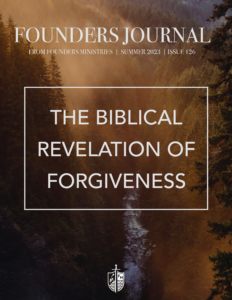In the last half of Ephesians 4, the Apostle Paul gives Christians practical guidance on what it means to “put on the new self, created in the likeness of God in true righteousness and holiness” (v. 24). He concludes his list of applications with a positive admonition regarding forgiveness. “Be kind to one another, tenderhearted, forgiving one another, as God in Christ forgave you” (v. 32). The measure of the forgiveness that Christians owe to one another is the forgiveness that God has shown to us in Christ.
These words are not hard to understand. They are simply hard to do. Forgiveness is a specific act that grows out of a gracious disposition. It is a plant that springs out of the soil of kindness and tenderheartedness. To be kind is to treat people with compassion. It is an attribute of genuine love (1 Corinthians 13:4) and is characteristic of God, whose “kindness is meant to lead you to repentance” (Romans 2:4).
To be tenderhearted to others is to be gentle and welcoming to them. It is an idiomatic term that suggests enlarging your heart so that your sincere affection for someone becomes evident. To have a tender heart toward someone is to want what is best for them, to desire their welfare. Like kindness, tenderheartedness is characteristic of our Lord who will not break a bruised reed nor quench a smoldering wick (Isaiah 42:3-4).
It is no wonder, then, that Paul follows up his admonition in Ephesians 4:32 in the very next verse with “Therefore be imitators of God, as beloved children” (5:1). Neither is it surprising that he prefaces this admonition by telling Christians that we must put away “all bitterness and wrath and anger and clamor and slander” (4:31). Such bitter weeds pollute the soil and prevent forgiveness from sprouting.
By mortifying deadly vices and cultivating godly virtues, we become spiritually equipped to live in forgiveness, which is what we are commanded to do in v. 32. “Forgiving one another” includes specific, intentional decisions, but Paul here considers such decisions as an ongoing activity of the Christian life. We can sympathize with Peter’s question to Jesus, “Lord, how often will my brother sin against me, and I forgive him? As many as seven times?” (Matthew 18:21). He probably thought he was being generous. But Jesus’ answer is the foundation of Paul’s admonition: “I do not say to you seven times, but seventy-seven times” (Matthew 18:22).
As children of the forgiving God, Christians must cultivate a lifestyle where forgiveness is the norm. As we seek to be kind and tenderhearted, we should stand ready to forgive and to forgive “as God in Christ” has forgiven us. That is the standard, the measure of our forgiveness. What did God’s forgiveness of us cost Him? The cross is the answer to that question. Then how far, at what cost, and how often should we forgive one another? Only as far as and to the same degree that God has forgiven us through the sufferings and death of Jesus.






























